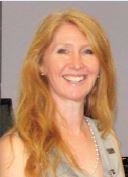Michelle Stock - 2015 SPIE Women in Optics Planner
President of mlstock consulting; Chairperson of Mi-Light (the Michigan Photonics Industry Cluster)
Country of Birth: USA
Educational Background: BSEE, MSEE, and Ph.D. EE (Ultrafast optics major) University of Michigan, USA

I have two 'jobs' - one is my day job working as a consultant, drawing on my background in laser product development (as an engineer and a product manager), know-how in marketing and sales, and experience doing business development for small or start-up businesses in the ultrafast or fiber laser space. I need a strong grasp of both the client's technology and its applications, and the customers and their needs; my role is often to act as a translator, helping engineers and sales people communicate with customers, and helping customers communicate their requirements back to marketers and engineers.
My second 'job' is to lead Mi-Light, the Michigan Photonics Industry Cluster. As the first Chairperson of this new, all-volunteer trade association, I have had the opportunity to learn about the broader photonics industry, to have an impact on economic development, to work with partners like SPIE on the National Photonics Initiative to advocate for our industry, to help my colleagues across the state of Michigan shape education to serve our companies, and to act as a connector to bring people together to promote and grow photonics within and outside of Michigan. Both areas of work are immensely satisfying in different ways.
For young women who are considering the path for their life's work, keep in mind that a strong foundation in STEM subjects provides the possibility for so many options, both at the beginning of a career and further down the road. With an engineering degree, you can immediately find work after a Bachelor's degree, or you can go deeper with an advanced degree, leading to opportunities in advanced product development or academics.
If you think that having a career in engineering means that you will work alone, keep in mind that most engineering is done in teams, that you often have to interact with the users of the product you develop, and that you can move into other ‘outward facing' roles - I found that those opportunities were the most fun for me, because I could see the direct impact of the product I was developing.